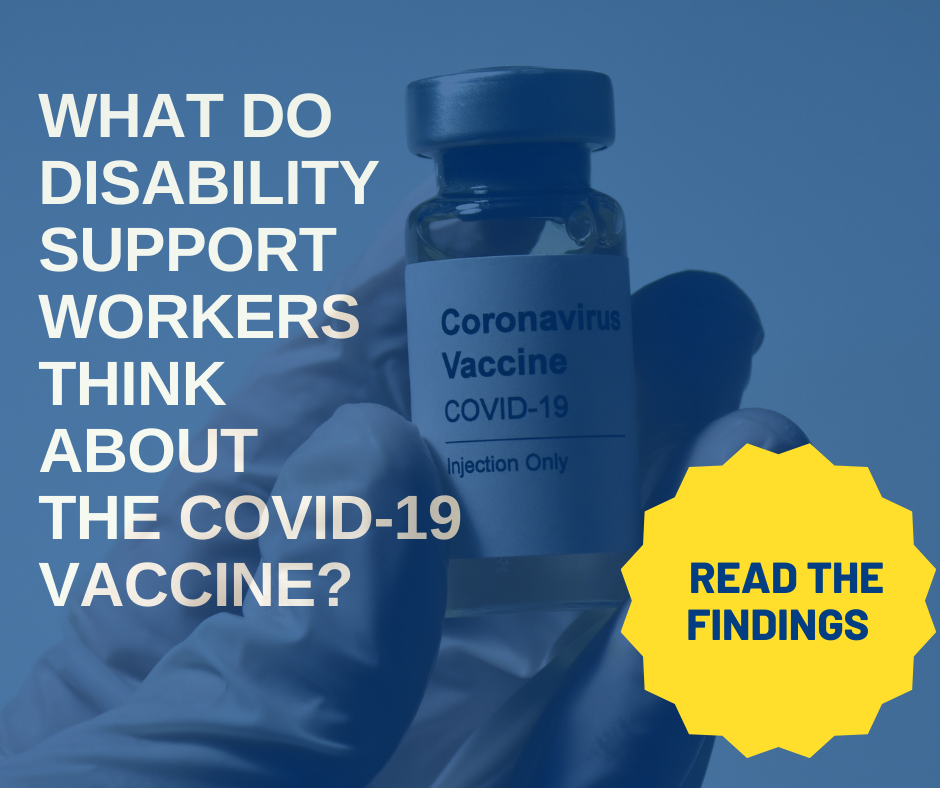COVID-19 Vaccine hesitancy and the Disability Support Workforce
Between March and April 2021, researchers from the University of Melbourne and UNSW Canberra conducted an online survey of over 350 disability support workers (DSWs) about their opinions and needs surrounding the COVID-19 vaccine.
Disability support workers (DSWs) are at greater risk of being infected with COVID-19 because they work with people with disability who may also be supported by numerous other support workers.
DSWs are also at risk of transmitting the virus to the people with disability they support, many of whom have underlying conditions that place them at risk of serious complications from COVID-19 if they become infected.
It was for these reasons that people with disability living in disability residential settings (group homes) and the disability support workers (DSWs) working in the homes were prioritised in Phase 1a of the vaccine
rollout. DSWs not working in group homes are in Phase 1b.
368 DSWs across Australia participated in a survey about their experiences during the COVID-19 pandemic. They were asked about perceptions of their
risk of infection, where they obtained information about the COVID-19 vaccine and what sources of pandemic information they trusted, their intentions for vaccine uptake (vaccine hesitancy) and, for those who were hesitant, the reasons why.
Key findings
DSWs’ own doctors and Chief Medical Officers were the most trusted sources of information about the COVID-19 vaccine
• Overall 21% of DSWs had been offered vaccination
• 29% of DSWs in group homes had been vaccinated compared with 14% of DSWs who did not work in group homes
• The main sources of information about the vaccine were government websites (72%), employers (62%) and official news media (62%)
• 50% would get the vaccine as soon as possible
• 9% would wait until the vaccine is available for a while
• 11% would only get vaccine if required
• 13% hadn’t decided either way
• 17% will not get vaccine
Vaccine hesitancy
The mains reasons for delaying the vaccine or refusing it were around inadequate safety data, concern about the side effects and a lack of trust in government to ensure vaccines are safe and effective. Very few were against vaccines in general so the concerns related to COVID-19 vaccine only.
Views on vaccine
Many DSWs did not display confidence in the vaccine:
• 58% agreed the vaccine is the best way to stop the COVID-19 pandemic
• 63% agreed that the vaccine will only stop COVID-19 if most of the community is vaccinated
• 54% agreed that their chances of getting COVID-19 will decrease after they had the vaccine
• 54% agreed that their clients were less likely to get COVID-19 if they had the vaccine
Interpretation of findings
The high levels of vaccine hesitancy and concerns about effectiveness and safety among DSWs suggests that significant work is to be done to build trust in the vaccine in the sector. In our previous surveys DSWs described feeling forgotten in the pandemic so their low levels of trust in government is understandable in this context.
DSWs lack confidence in the vaccine protecting them, the community and the people with disability they support. Less than 1% of the overall sample were against all vaccines. Thus, vaccine hesitancy appears to be related to COVID-19 vaccines in particular.
Given that very few DSWs are opposed to all vaccines, it is possible that higher levels of vaccination could be achieved.
A COVID-19 Disability Vaccination Strategy
We recommend that a strategy to improve uptake of vaccination among DSWs is developed urgently. However rather than a strategy that just covers
DSWs, we recommend that a COVID-19 disability vaccination strategy that is co-designed with the whole sector including people with disability,
DSWs and service providers. First trust needs to be built by listening and responding to the concerns of these groups. Only then can confidence about
the efficacy and safety of the vaccine be improved.
Further information
This study was developed by researchers from the University of Melbourne and UNSW Canberra. This is a follow up to our study on how support workers were impacted during COVID-19 in 2020. COVID-19 and the Disability Support Workforce Research Report can be found here
If you have any questions about the reports, please contact (03) 9035 4554 or email stefanie.dimov@unimelb.edu.au
Publications:
- Disability Support Workers: COVID-19 vaccine hesitancy and communication needs – Report (30 April 2021) (Web, PDF)
- Predictors of vaccine hesitancy among disability support workers in Australia: A cross-sectional survey – Disability and Health Journal (October 2022) (Web)
Fact Sheets:
- Fact Sheet 1 – COVID-19 Vaccine Hesitancy and DSWs
- Fact Sheet 2 – Communicating about COVID-19 Vaccine with DSWs
Media:

